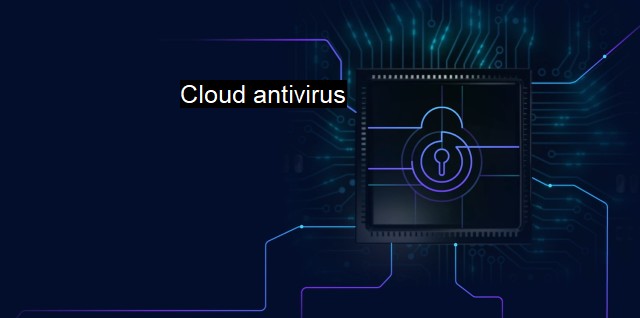What are Cloud antivirus?
Fortifying Cybersecurity with Cloud Antivirus: Cutting-Edge Protection against Evolving Threats Through Machine Learning and Cloud Technology
Cloud antivirus represents an innovative approach to defend computers against different cyber-threats. antivirus solutions play a substantial role in shielding computing systems and the data they handle. Traditionally, we are acquainted with the locally installed antivirus software which requires continuous updates and maintenance. with technological advancements, protection against cyber threats has taken on a different dimension, and that is where Cloud Antivirus entered the scene.The term "Cloud Antivirus" refers to the technology that conducts security-oriented operations over a remote server, rather than the user's computer. It works on the principle of Cloud Computing, in which data is stored and processed through the internet on secure virtual servers, rather than your local servers or personal computer.
By effectively leveraging cloud technology, users can access robust analytical tools based on the latest intelligence about malware attacks and threats while using minimal processing power on their own devices. Leveraging this method, antivirus protection can be always up-to-date, agile, and effective across multiple platforms without bottlenecking the individual devices' processing capacities.
Primarily, the ability of a cloud antivirus solution to deal with newer threats and sophisticated malware emanates from its centralized and interconnected design. Malware and threat databases are hosted in the cloud and are frequently updated in real-time. There is no need for an end user to manually accept updates, as the antivirus protection continually evolves at the server level.
One of the main advantages of cloud antivirus solutions lies in the improved processing power. With storage and data crunching operations performed on distant servers, more memory is freed up on devices, thus substantially speeding up their performance. Besides, any threats detected on one protected device can update the entire network, providing rapid containment of new threats.
Another notable benefit is that cloud antivirus platforms can provide network administrators with high visibility and control over their network security. The centralized nature of cloud antivirus systems allows real-time monitoring, reporting, and updates from anywhere with internet connection.
Cloud antivirus security allows users to receive protection across multiple devices. Thus you can secure laptops, smartphones, or tablet devices under one cloud-based security solution. It provides a more holistic solution for modern users who tend to operate on multiple devices.
Despite all these benefits, it is vital to acknowledge that using cloud-based antivirus programs also comes with possible drawbacks. Internet connectivity is a crucial requirement for cloud antivirus software to be effective since its database located in the cloud is needed to check for new viruses constantly. If there's no internet connection, the threat detection and removal strength of cloud antivirus would be disrupted.
Cloud antivirus solutions have opened the pathway to a new generation of internet security and antivirus technology. Under the context of cybersecurity and antivirus, it displays a new altitude of dynamic defense and sources a massive boost in memory processing. Looking ahead, as we continue to evolve and connect digitally, cloud-based approaches, like cloud antivirus, will play an ever-present and increasingly essential role in maintaining a safe digital sphere.

Cloud antivirus FAQs
What is a cloud antivirus?
A cloud antivirus is an antivirus software that uses cloud-based technology to protect the user's device from malware and other cyber threats. Unlike traditional antivirus software that runs on the user's device, a cloud antivirus relies on a network of servers that are constantly updated with the latest threat intelligence.How does a cloud antivirus work?
A cloud antivirus works by scanning files and processes on the user's device and comparing them against a database of known malware signatures stored in the cloud. If a match is found, the cloud antivirus will quarantine or remove the malware. In addition, many cloud antivirus solutions employ behavioral analysis and machine learning algorithms to detect and block new and unknown threats in real-time.What are the benefits of using a cloud antivirus?
There are several benefits to using a cloud antivirus, including: 1. Real-time protection: A cloud antivirus can detect and block new and emerging threats in real-time, providing better protection than traditional antivirus software. 2. Low resource usage: Since the heavy lifting of scanning and analyzing files is done in the cloud, a cloud antivirus places less strain on the user's device, which means better performance. 3. Automatic updates: A cloud antivirus is constantly updated with the latest threat intelligence, so the user doesn't have to worry about manually updating their software. 4. Centralized management: Many cloud antivirus solutions allow for centralized management, making it easier for IT professionals to monitor and protect their organization's devices.Do cloud antivirus solutions protect against all types of cyber threats?
While cloud antivirus solutions are effective at detecting and blocking known and unknown malware, they are not foolproof. Cybercriminals are constantly developing new and sophisticated attacks that can evade even the most advanced antivirus software. It is important to use multiple layers of security, such as firewalls, intrusion detection/prevention systems, and user education, in addition to a cloud antivirus solution to ensure comprehensive protection against cyber threats.| | A | | | B | | | C | | | D | | | E | | | F | | | G | | | H | | | I | | | J | | | K | | | L | | | M | |
| | N | | | O | | | P | | | Q | | | R | | | S | | | T | | | U | | | V | | | W | | | X | | | Y | | | Z | |
| | 1 | | | 2 | | | 3 | | | 4 | | | 7 | | | 8 | | |||||||